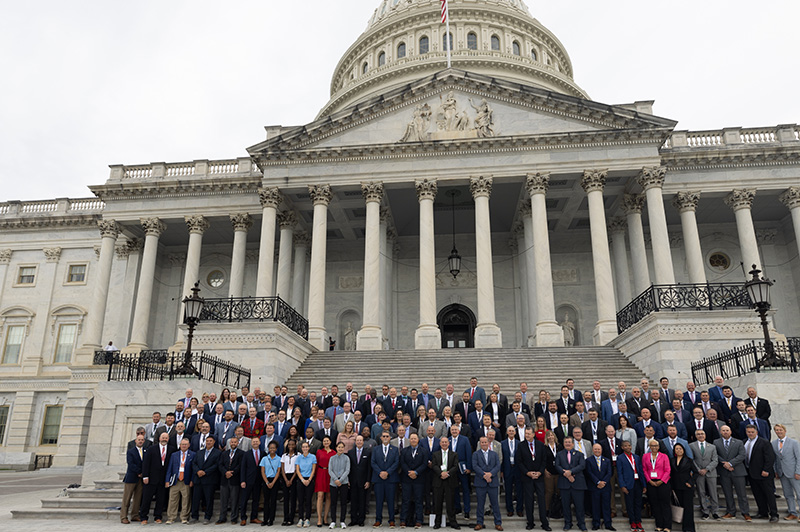
Attendees at the 2024 National Golf Day standing together on the steps of the United States Capitol Building ahead of legislative visits. Photo by Scott Ramsay
Editor's note: National Golf Day is April 30-May 2, 2025. GCM is covering GCSAA's involvement in the event with stories all week long. To keep up with our complete coverage, click here.
As the golf industry heads to Washington, DC for National Golf Day, it is important to remember that not all legislating happens in our nation’s capital. Spring is also a busy time for state legislatures around the country who, year in and year out, consider bills that could impact the way golf courses are managed.
According to the National Conference of State Legislatures, there is a total of 7,575 elected officials serving as state house and state senate members, each of whom have the ability to introduce, advance, and influence measures affecting land management, plant health, outdoor power equipment, and a host of other issues impacting superintendents. Compare that to just 535 members serving in a gridlocked United States Congress and one quickly realizes the importance of advocating at the state level.
Thus far in 2025, more than 30 bills have been filed in state capitals across the country that in some way could impact golf course management. Not all of these proposals have a chance at passage, but many of them will at least be heard in committee, and some of them may even advance through one or both chambers and become law. Below is a review of some of the more concerning pieces of legislation we are currently tracking, listed alphabetically by state.
By California standards, there are few bills of concern, but certainly one which the golf industry eagerly supports, that being SB 72, the California Water Plan, which generally seeks to increase water supply to meet current and future needs by addressing issues related to development of new water storage facilities, groundwater recharge, water recycling, desalination, conservation measures, and more. On the other hand, the California golf industry opposes SB 51 which would move the state to permanent standard time. Not only does the bill go against the desires of a vast majority of California’s – as demonstrated by a 2018 ballot measure – it would also mean fewer opportunities for evening rounds and harm junior and high school golf programming.
Connecticut’s legislative session is shaping up to be similar to years past with numerous bills filed that would restrict or ban the use of insecticide and rodenticide products, even for certified applicators. Superintendents are aware of these bills and providing testimony as needed.
In Massachusetts, H 950 would make glyphosate products restricted use, while S 587 would prohibit the use of neonicotinoid-based insecticides. Meanwhile H 954, amongst others, would create a patchwork of differing local ordinances by permitting municipal governments to regulate pesticide use.
For years, pesticide issues in New Jersey created great challenges, but it appears the issue du jour as now changed to the use of outdoor power equipment. Although apparently stalled due to opposition, S 217 would prohibit the sale and use of gas-powered leaf blowers statewide. Meanwhile, at the local level in West Orange, NJ, a veto by the mayor of an ordinance banning the use of gas-powered leaf blowers was upheld by the council over cost concerns.
New York’s Bethpage State Park will play host to golf’s most exciting international tournament, the Ryder Cup, this fall. However, that hasn’t stopped Albany lawmakers from introducing numerous proposals making golf course management more difficult, including bans on the use of turf health products on state park lands, bills banning the use of leaf blowers and mowers, and S 5983 which undermines state level regulation of pesticide applications.
Landscaping equipment rebate programs have come into vogue in recent years as lawmakers try to incentivize conversion to battery-powered equipment. GCSAA is generally supportive of such programs, given they don’t mandate conversion and that they include golf courses as qualifying businesses for the rebate. However, S 1574 in New York, and HB 3016 in Oregon, as introduced, unfortunately appear inclusive of only landscape contractors and not golf course superintendents.
Regardless the issue, where public policy and golf course management intersect, GCSAA will continue to fight for the best interest of its members while advancing their profession.
Michael Lee is GCSAA’s Sr. Manager of Government Affairs